CHAMPION JACK DUPREE / “Champion Jack Dupree Mixtape”
There is a vicious rumor circulating among peoples nowadays—among both the educated and the illiterate (I almost said “ignorant” but I believe many so-called ignorant folk know better than to believe hearsay). Anyway, the sinister suggestion is that the blues started in Mississippi.
But how could that be, most especial if one considers the blues a byproduct of chattel slavery in North America? As bad as Mississippi is and has been—and make no mistake, Mississippi is goddamn bad—but its damn-ness not withstanding, before most of us got to Mississippi we were well cloaked in the blues.
So to make sure what I’m saying is not mis-stated and/or misunderstood, I probably need to follow my daddy’s advice in terms of making things plain and say it loud and proud out the front part of my mouth: the blues was not the product of a place but rather the result of aurally dealing with a condition endured by Africans as we transitioned into American Negro-hood.
Negroness: something like a genetic disease we caught, and caught hell shaking loose from—truth be told most African Americans are more Negro today now that many of us are educated than when we were consciously estranged from what brother Langston poetically called “the ways of white folks.” In other words when they didn’t teach us we knew more about ourselves and about them.
Champion Jack Dupree is a prime example of what I’m trying to talk about. The man has over 75 albums under his name and appears on over 100 other albums. You read correctly, my man Champion Jack Dupree is approaching the 200 album mark. And the average music fan has probably never heard of Champion Jack Dupree, not to mention don’t own or listen to any of his music.
More over the “Champion” in his name is neither an honorific nor a stage name. In the thirties Jack Dupree was a Golden Gloves boxing champion.
William Thomas Dupree, born circa July 1908 or 1909 or 1910… let’s just say born in the early decade of the 20th century, no definitive records exist. His parents (a father from the Congo and a mother who was part Cherokee) died in a fire when Dupree was a toddler around two years old. As an orphan he was remanded to Louis Armstrong’s home, the New Orleans Home for Colored Waifs. He grew up with music and learned to play barrelhouse piano under the street tutelage of the great Tuts Washington and the legendary Willie “Drive ‘Em Down” Hall.
One of the great traditions of New Orleans is often taken for granted, i.e. the piano professors: starting with Tony Jackson at the turn of the century and his major student, Ferdinand Jellyroll Morton, and Jellyroll’s contemporary Clarence Williams, on through a long list of great professors who were prolific and profound as both performers and teachers. That list includes Professor Longhair, the aforementioned Tuts Washington, Champion Jack, Allen Toussaint, James Booker, Ellis Marsalis and Dr. John.
Many people don’t connect the dots when it comes to the early development of Black music. Most people think of ragtime as the immediate predecessor to jazz but ragtime was a piano music.
Once the music cohered into jazz in New Orleans it almost immediately split—New Orleans music produced both marching street bands and sit down bands. The street bands gave us the modern jazz trumpet tradition but usually overlooked is the fact that the sit down bands gave us the modern jazz piano tradition. The early beginnings of modern jazz piano is usually credited to Earl "Fatha" (i.e. "father") Hines when Fatha Hines was playing with Louis Armstrong. Fatha followed Lil Hardin Armstrong in the Armstrong band. They were playing New Orleans music.
Modern jazz piano emphasized single-note, horn-like solos and less use of chords in the right hand for solos. Earl Hines is generally credited as being the first master of this style. However, as you can hear in Champion Jack's playing, the New Orleans piano professors developed their own solution to the music becoming more horizontal (single-note lines) and less vertical (multi-note chords).
By the time of Armstrong's seminal small combo recordings, he was working out of Chicago and as a result most people make no New Orleans connection but the musicians were moving back and forth, especially once the depression hit. An example of this connection would be the fact that in 1930 Champion Jack decamped New Orleans heading to Chicago and Detroit (where Joe Louis encouraged Champion Jack to pursue boxing).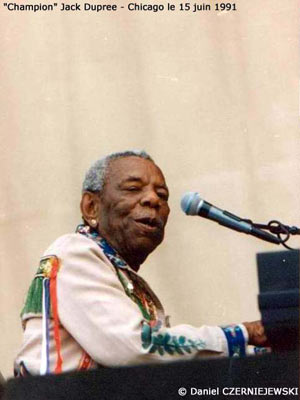
In the forties and fifties Champion Jack actively worked as a blues pianist and vocalist. Although he had only limited commercial success by today's standards, he had a hearty audience among his people and recorded steadily. Champion Jack developed a witty and sometimes poignant storytelling style of the blues that reveled in short narratives and pithy punch lines.
Champion Jack was a veritable singing history book. His 1958 recording Blues From The Gutter is his master recording from the pre-Europe phase of his career.
In 1959 he left for an extended European sojourn. In 1990 Champion Jack returned to New Orleans for his first visit in over thirty-five years and recorded three superb albums before making his final transition on January 21, 1992 in Hanover, Germany, cut down by cancer. 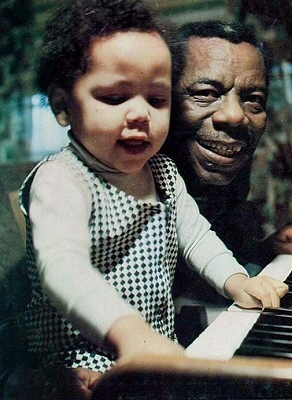
I remember seeing Champion Jack at Ultrasonic Studios when he was recording for Rounder Records. I also had an unforgettable opportunity to study him up close, standing in the wings of an awe inspiring performance at a music festival in Martinique—the announcer only half-jokingly referred to Champion Jack as the Shakespeare of the blues. The music Champion Jack made in his last years was as strong as anything he had ever recorded.
I was talking to a New Orleans musician not long ago and we both declared we wanted to go like legendary New Orleans musicians go, on the bandstand, playing their ass off until the butcher cuts you down. Playing strong, hard, masterful music until the very moment of death is our way of living. That’s a part of our music you don’t learn in any book or at any music school other than the school of life and the book that is the diary of your life’s work.
I know this is a lot to absorb at one sitting but people Champion Jack Dupree offers us a concise history of a branch of the blues that is generally overlooked by those studying the music. Although New Orleans is primarily known as a trumpeter’s town (from Buddy Bolden, King Oliver and Louis Armstrong down to Wynton Marsalis, Terence Blanchard and ongoing young giants like Christian Scott), there is another blues tradition; a tradition that is resplendent, unique and totally engrossing: the New Orleans tradition of blues-based piano professors, and Champion Jack Dupree is a preeminent keyboard king.
—Kalamu ya Salaam
Champion Jack Dupree Mixtape Playlist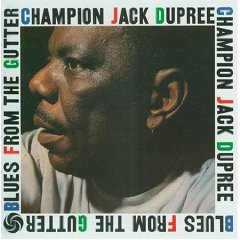
From Blues From The Gutter (1958)
01 “T B Blues”
02 “Can't Kick The Habit”
03 “Bad Blood”
04 “Goin Down Slow”
05 “Frankie and Johnny”
06 “Stack-O-Lee”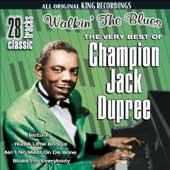
From Walkin’ The Blues: The Very Best of Champion Jack Dupree (2003)
07 “Tongue Tied Blues”
08 “Camille”
09 “Harelip Blues”
10 “That's My Pa”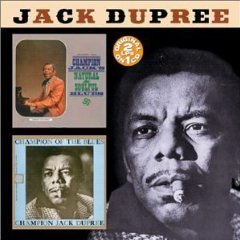
From Natural & Soulful/Champion of the Blues (2001)
11 “Slow Drag”
12 “Mother-in-Law Blues”
13 "Rampart Street Special”
14 “Death of Big Bill Broonzy”
15 “Bad Life”
16 “How Long Blues”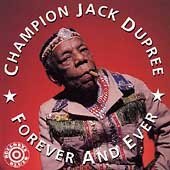
From Forever And Ever (1991)
17 “They Gave Me Away”
18 “Hometown New Orleans”
19 “Forever And Ever”
20 “Yella Pocahontas”
21 “Let's Talk It Over”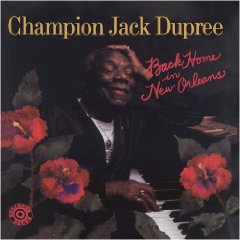
From Back Home In New Orleans (1990)
22 “The Blind Man”
23 “Freedom”
This entry was posted on Monday, June 15th, 2009 at 6:42 am and is filed under Classic. You can follow any responses to this entry through the RSS 2.0 feed. You can leave a response, or trackback from your own site.
3 Responses to “CHAMPION JACK DUPREE / “Champion Jack Dupree Mixtape””
June 15th, 2009 at 8:24 pm
As we used to say in my day “teach brother”. So much to (un) and relearn.
August 6th, 2009 at 3:06 am
I recently came across your blog and have been reading along. I thought I would leave my first comment. I don’t know what to say except that I have enjoyed reading. Nice blog. I will keep visiting this blog very often.
Sara
April 8th, 2011 at 3:24 am
I was looking to hear Jack singing his famous Mother in law Blues. I found your site and was impressed. I was turned on to Champion Jack Dupree when I was a tiny tot. My father, bless his heart, used to play that song whenever my mom’s mom would call or come over. And let me tell you…my grammy was some kind of skinny!!!! I grew to love the blues from listening to Jack pump them out on my father’s record player. Love them blues and Love Champion Jack Dupree.
Leave a Reply
| top |